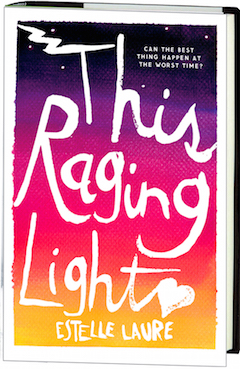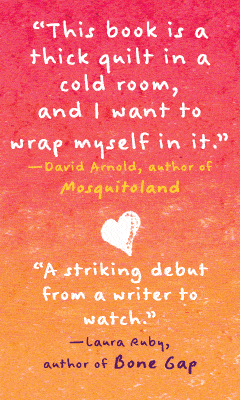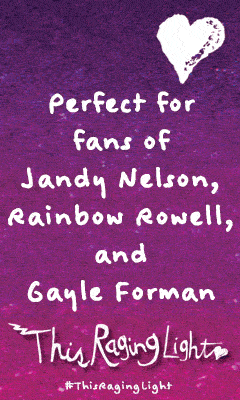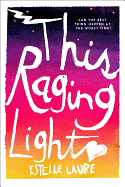This Raging Light
by Estelle Laure
High school senior Lucille Bennett mothers her nine-year-old sister, Wren, because she has no choice--her parents are AWOL. Her mom "needed a break from everything," and said she'd be back in two weeks, but it's Day 14 and there's no sign of her. And as readers learn in bits and pieces, Lucille's too-cool rock 'n' roll father was checked into a mental facility after choking her mother; she doesn't even know if he's still in New Jersey.
Lucille braids her sister's hair and pretends everything is normal as she walks Wren to her first day of fourth grade, before reporting to her high school English class. Fortunately, because she and Wren have eaten nothing but frozen pizza for days, her best friend Eden Jones invites her over that night for family-style meatballs. Less fortunately, visiting Eden's family has become a bit awkward since Lucille has fallen "desperately, never-to-recover, twisted-up sick" in love with Eden's handsome, sonnet-worthy, taken twin brother, Digby, a boy she's known since she was seven but who lately makes "a fumbling moronic moron out of me, a full-on half-wit." More awkward still, it's become increasingly difficult to hide the fact that she and Wren are living on their own.
Chillingly, the next chapter is entitled "Day 27." Lucille and Wren are almost out of food and money--Lucille has even checked under the sofa cushions for change--and the bills are going unpaid. Lucille doesn't want the authorities involved, so the only person in the world she can confide in about her dire straits is Eden, and even that isn't easy for her: "Trust. What does it even mean? You hand somebody the knife to stab you with when you trust them." One night, Lucille asks Eden a hard question.
"Do you think my mom loves us?" I ask.
She watches me for too long, chooses her words so carefully. "It doesn't matter if she loves you or not." She tucks long fingers inside her sleeves, lets them dangle.
"Really?" I say.
"All feeling has an equivalent in action or is useless."
"Did you say that?"
"Of course not," she says. "Virginia Woolf."
"Oh."
By Day 28, Lucille has landed a job at Fred's ("part performance art, part Mexican restaurant, all wild") where the "special-ops force is a bunch of badass chicks with taco guns." She doesn't know how she'll work four nights a week with Wren to take care of; Eden can only cover her for two. Days turn into months, all punctuated by mysterious kindnesses, the agony of forbidden love, a little sister who's trying to be brave and, eventually, a trip to the halfway house to visit her "selfish shell" of a dad who can't seem to grow up.
Lucille's fresh, first-person voice spills over with metaphor, poetically capturing her emotional landscape with force and fury, frantic love and absolute exhaustion. When Lucille first sees her father, her head feels empty, or "made up of ten thousand balloons." She sees him "trying to smooth his fiery parts." When Lucille kisses Digby, "it's like we are the hungriest people on earth and someone has just served us to each other for dinner, for dessert." From Lucille's point of view, Wren "laughs like she's ten billion years old" or looks like "some kind of really festive Viking attacking a feasting table."
Lucille needs to keep it together for Wren, and represses her emotions to such a degree that they occasionally erupt in the wild colors of her paintings, in her passion for Digby and in angry outbursts that only serve to alienate the ones she loves. Wren is a nuanced character, full of surprises and wiser than Lucille realizes. She puts on a happy face for her older sister, not because she doesn't know what's going on but because she knows her sister needs her to be happy. Wren is a good sport, but her anxiety about missing her mother and having to lie about their home situation comes out sideways with jarring "your mama's so..." jokes, and in her endearing, poignant obsession with the Barefoot Contessa she idolizes.
As horrifically irresponsible as Lucille's parents are ("I got double douched in the parent department," she tells Eden), her friends stretch their ability to help Lucille to their very limits and beyond. When Lucille realizes that Eden's ballet is suffering because she's babysitting Wren, she says, "That's the trouble with letting people help. It always costs somebody something."
Debut author Estelle Laure's This Raging Light starts with abandonment but ends with people caring for people, and the voice is tough and tender in equal measure. Eden reminds her fierce and capable friend Lucille of the Welsh poet Dylan Thomas's powerful line in "Do not go gentle into that good night:" "Rage, rage against the dying of the light." Rage she does, in so many ways, and readers will be rooting for her the whole way. --Karin Snelson








